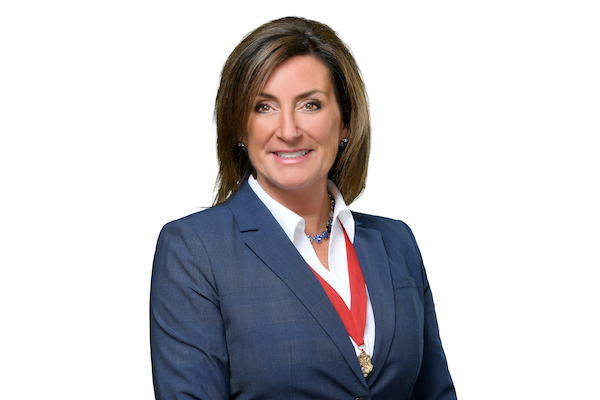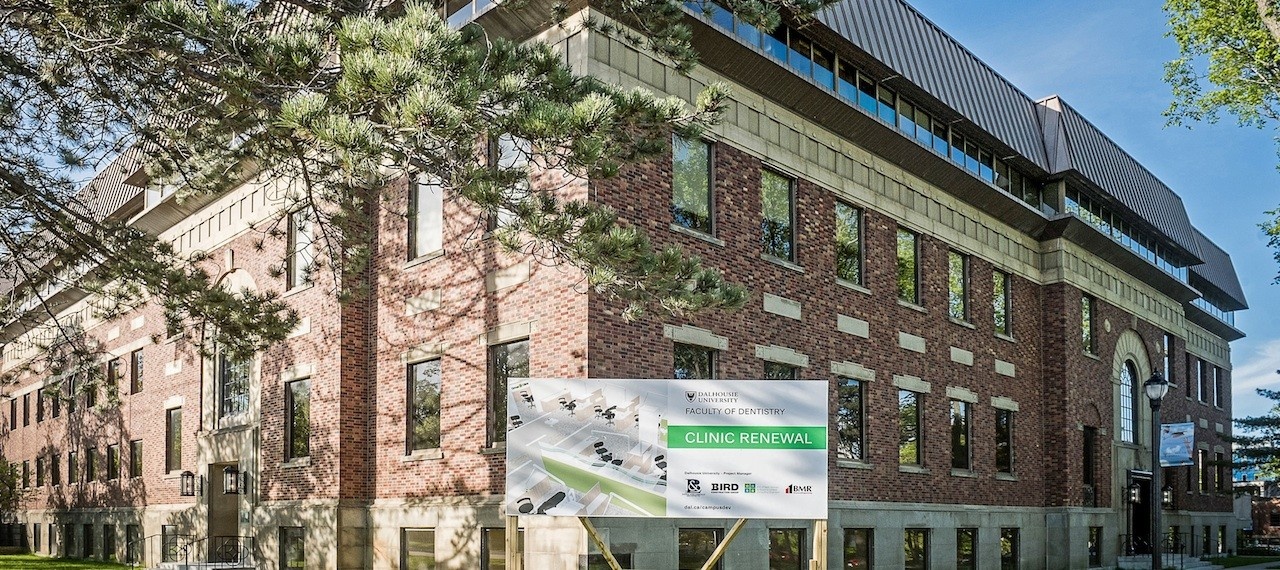News
» Go to news mainA belief in mentorship and wellness: Dr. Joanne Thomas

Dr. Joanne Thomas (DDS’89) is a busy practising dentist and the owner of Tacoma Dental Centre in Dartmouth. In the summer, she added to her responsibilities by becoming president of the NSDA. A believer in wellness for all oral health professionals, Dr. Thomas is committed to helping NSDA members – students and practising dentists – through mentorship and support for their physical and mental health.
Q: Could you talk a bit about your path to becoming a dentist?
JT: In high school I knew I wanted to work with people. I enjoyed sciences and problem-solving. The prospect of owning my own business appealed to me as well.
Q: Did you apply to other dentistry schools, or were you set on Dal?
JT: Dalhousie was the only dentistry program I applied to, but I also applied to other schools for different things, including architecture and a masters in biochemistry. I also considered medicine, but I was not attracted to the idea of looking after a whole person’s body. I was thinking of something more focused, where I could use my hands. Part of our aptitude test for dental school is to do a carving – it’s part of our manual dexterity test. It seemed to come quite naturally to me. I enjoy that I can delve into this one part of the body and really get to know it – and also make a difference to my patients’ health overall.
Q: Were you mentored in dental school?
JT: When I was in dental school, there was no official mentorship program. But I believe that mentorship happens in many ways. I can recall that one of my third-year instructors was very passionate about restorative dentistry and he shared that with us. He brought in some of his own tools and instruments and he purchased enough finishing burrs to be able to give one to each of us. As a student, that was amazing. We were able to experience the difference it made, compared to what we were using in the clinic. It was a great insight into learning beyond the classroom.
I also had opportunities for informal chats with colleagues about the different aspects of practicing – things that you just wouldn’t be taught in a formal educational setting. And then there were instructors who shared their philosophy of what it means to be a professional and how to balance it with your life and the stresses of doing what we do.
But there were some things missing that could have been helpful, too, which has led me to this position with the NSDA and what I want to do.
Q: What are some of those things you would like to close the gap on?
JT: We’d like to help new dentists learn about running a business, managing a team, and balancing those things with providing patient care. My plan for the NSDA mentorship program is that we start by asking the students what they need. In turn, they can share with us some of the new techniques that they have learned. We’d like to have a two-way flow of information and a shared learning model.
Q: What does the new NSDA mentorship program look like?
JT: We’re starting with a panel discussion at the Faculty of Dentistry on November 20. We’ve also got about 10 dentists who have stepped up to be volunteers to mentor students.
In the past, we’ve tried to match students with practising dentists, but we found that third and fourth-year students didn’t really have the time for this. We have a new platform on the NSDA website called Higher Logic. We already have the students on there – they’ve logged in and created their profiles – and we’ve got dentists who have done the same. Now they’re in a little community online where mentors and mentees can be matched, based on shared interests and other information. I feel that’s more sustainable than having a paired match that may not work between two different personalities. We’re hoping this model will provide a more appropriate exchange of information between like-minded people.
Q: Can young alumni use it as well to match up with a mentor?
JT: Not yet. We’ve got the training wheels on this program and we want to see how it works. But I suspect some of the students who graduate will want to stay connected with us.
A lot of students don’t realize that they are actually members of the Nova Scotia Dental Association. We are trying to expand their knowledge by telling them to take advantage of this membership. By being on this platform they can ask questions and have access to expertise in a non-judgmental manner. They can also use the mentorship section of the platform to find a mentor.
Q: When you went to Dal, how quickly did you know that dentistry was what you were meant to do?
JT: First of all, I enjoyed my class right from the start. It probably helped that there were several Newfoundlanders in it – 10 or 11 of us out of 40. I think the instructors I had in my first year were important to that feeling. They were very welcoming and made the learning process very interesting. Just learning about teeth and connecting it to how you can make an impact on someone’s health and life and happiness was great. We might be struggling away in labs at all hours of the night – there was a lot of work! – but I never doubted that I was in the right field.
When I graduated and started working, there were times when it was really, really hard. I’ll share that because I think sometimes dentists work in silos. It can be a very lonely way to work, especially after the camaraderie of dental school. In practice, you are looking at tiny things all day long. And people don’t want to be there – they’re nervous. And then you’re running an office with the pressure of managing staff, collecting money, and all kinds of things. It can get very overwhelming. The connection with my dental school friends helped me, but not every class is like that. I’m hoping that mentorship will help to provide some much-needed support.
Q: What are your main goals and objectives as NSDA president, besides mentorship?
JT: The CDA recently released a report called “The future of the profession” that looks ahead to the year 2032 and points out areas the profession of dentistry needs to prepare for, including access to care for marginalized people. This includes people with special needs and those in long-term care facilities – the number of seniors in NS is only going to grow. We are also looking at how dentistry is changing and how our association needs to respond to those changes and help our members. For example, corporate dentistry is a new model that needs to be considered.
Another very important objective for the association is to support our members’ wellness. By that we mean being healthy to continue practising, supporting members with work-life balance, providing guidance on day-to-day practice questions, and also offering services that help the whole practice team. Dentistry is not delivered by one person. It’s delivered by a team. I’m always trying to build good collegial bonds with other groups and organizations.
Q: What advice would you give current dentistry students while they’re in school and thinking about life beyond school?
JT: That’s actually not too hard because I have a son who’s in dental school – in Ireland. I think what I’d say to him – and what I have said to him – is be curious, listen, and ask a lot of questions, because that’s how you learn. Realize that it’s a journey and you’re not going to wake up one morning and say “OK, I’ve mastered it all.” I love going to CE courses because I always say if I can come away with one little gem – even if I’ve been there eight hours – sometimes that one gem can make all the difference when you take it back to the patient and your team. Also, realize that you’re not alone.
Q: Would you say there is anything special or different about the Dal school of dentistry? Is it normal, do you feel, to get so much unofficial mentoring?
JT: I feel it is unique because of the class size. It was also down to the instructors we had at the time. They were outstanding. I was very fortunate to have had people like Bob MacDonald, Tom Boran, Bill MacInnis—to name just a few – as role models.
Q: Do you have any other key messages?
JT: I think as a student, take advantage of any little opportunity that might come your way – like going to a panel discussion or taking someone aside to pick their brains for 10-15 minutes. You’ll be surprised at how you’ll come back to those moments later and say “Wow, I’m really glad I asked that question or had that conversation.”
I’d also like to mention wellness – mental health among dentists and their staff. When I went through dental school, no one talked about mental health. No one. We learned about fillings and materials, and dentures and crowns. No one talked about the mental health of you, the provider.
At the NSDA, members have access to the Members’ Assistance Program – MAP. It’s a program of services to help people with their mental health, their general health, family support, financial health – anything that causes stress in their lives. We’re trying to get people on board pre-emptively, to be aware of little signs before a crisis occurs.
Sometimes students don’t feel comfortable about letting people know things. I saw some of my fellow students struggle and I know we’re not all equipped to face things in the same way. Everyone needs a helping hand.
Recent News
- In conversation with Anna Quon
- Start planning for DentDays 2024
- Climb every mountain: Dr. Kevin Walsh enjoys a challenge
- The 2023 QEII Foundation Diversity in Health Care Bursaries: Part of this community
- A whole new ball game in the Faculty of Dentistry
- A donation with great impact
- DentDays dates announced
- 2024 JD McLean Lecture: An interview with Bob Hope
